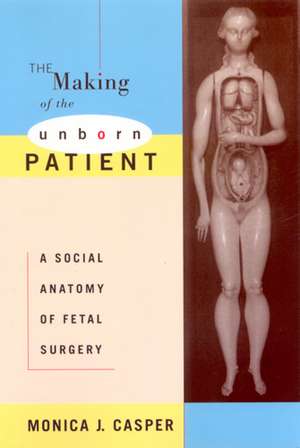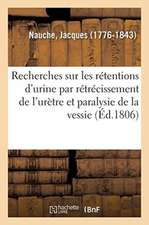The Making of the Unborn Patient: A Social Anatomy of Fetal Surgery
Autor Monica J. Casperen Limba Engleză Paperback – iun 1998
Winner of the 1998 C. Wright Mills Award from the Society for the Study of Social Problems
It is now possible for physicians to recognize that a pregnant woman's fetus is facing life-threatening problems, perform surgery on the fetus, and if it survives, return it to the woman's uterus to finish gestation. Although fetal surgery has existed in various forms for three decades, it is only just beginning to capture the public's imagination. These still largely experimental procedures raise all types of medical, political and ethical questions. Who is the patient? What are the technical difficulties involved in fetal surgery? How do reproductive politics seep into the operating room, and how do medical definitions and meanings flow out of medicine and into other social spheres? How are ethical issues defined in this practice and who defines them? Is fetal surgery the kind of medicine we want? What is involved in reframing fetal surgery as a women's health issue, rather than simply a pediatric concern? In this ethnographic study of the social, cultural and historical aspects of fetal surgery, Monica Casper addresses these questions. The Making of the Unborn Patient examines two important and connected events of the second half of the 20th century: the emergence of fetal surgery as a new medical specialty and the debut of the unborn patient.
It is now possible for physicians to recognize that a pregnant woman's fetus is facing life-threatening problems, perform surgery on the fetus, and if it survives, return it to the woman's uterus to finish gestation. Although fetal surgery has existed in various forms for three decades, it is only just beginning to capture the public's imagination. These still largely experimental procedures raise all types of medical, political and ethical questions. Who is the patient? What are the technical difficulties involved in fetal surgery? How do reproductive politics seep into the operating room, and how do medical definitions and meanings flow out of medicine and into other social spheres? How are ethical issues defined in this practice and who defines them? Is fetal surgery the kind of medicine we want? What is involved in reframing fetal surgery as a women's health issue, rather than simply a pediatric concern? In this ethnographic study of the social, cultural and historical aspects of fetal surgery, Monica Casper addresses these questions. The Making of the Unborn Patient examines two important and connected events of the second half of the 20th century: the emergence of fetal surgery as a new medical specialty and the debut of the unborn patient.
Preț: 275.47 lei
Preț vechi: 289.97 lei
-5% Nou
Puncte Express: 413
Preț estimativ în valută:
52.72€ • 57.24$ • 44.28£
52.72€ • 57.24$ • 44.28£
Carte tipărită la comandă
Livrare economică 23 aprilie-07 mai
Preluare comenzi: 021 569.72.76
Specificații
ISBN-13: 9780813525167
ISBN-10: 0813525160
Pagini: 288
Ilustrații: 1
Dimensiuni: 152 x 229 x 20 mm
Greutate: 0.4 kg
Ediția:None
Editura: Rutgers University Press
Colecția Rutgers University Press
ISBN-10: 0813525160
Pagini: 288
Ilustrații: 1
Dimensiuni: 152 x 229 x 20 mm
Greutate: 0.4 kg
Ediția:None
Editura: Rutgers University Press
Colecția Rutgers University Press
Notă biografică
MONICA J. CASPER is an assistant professor of sociology at the University of California, Santa Cruz. She is also affiliated with the Stanford University Center for Biomedical Ethics. The work upon which this book is based won the 1996 dissertation award from the American Sociological Association's Medical Sociology Section.
Cuprins
Contents
Acknowledgments
Introduction to fetal matters
Breaching the womb, a history of the unborn patient
A hybrid practive, traffic between the laboratory and the operating room
Working on (and around) the unborn patients negotiating social order in a fetal treatment unit
Clinical trials in fetal surgery : making, protecting, and contesting human subjects
Heroic moms and materal environments, pregnant women on the final frontier
Beyond the operating room
Notes
Glossary
Bibliography
Index
About the author
Acknowledgments
Introduction to fetal matters
Breaching the womb, a history of the unborn patient
A hybrid practive, traffic between the laboratory and the operating room
Working on (and around) the unborn patients negotiating social order in a fetal treatment unit
Clinical trials in fetal surgery : making, protecting, and contesting human subjects
Heroic moms and materal environments, pregnant women on the final frontier
Beyond the operating room
Notes
Glossary
Bibliography
Index
About the author
Recenzii
In a multi-site analysis that takes the reader from place to place (from the laboratories, to hospitals, to media discourses, etc.) where the story of fetal surgery unfolds, the book's chapters lay out a well-ordered and well-documented series of arguments....The central argument of the book is that the making of fetal surgery has, simultaneously, built on and contributed to the making of the fetus, as both patient and person. Furthermore, fetal patient-and personhood has been based on the assumption of a conflict of interests between mother and fetus. As Casper convincingly argues, this assumption is a cultural artifact, not a natural fact...The book should be of major interest to activists in the women's health movement.
An exemplary study of an astonishing and controversial medical specialty, The Making of the Unborn Patient is, at the same time, a lucid commentary on health-care politics, women's rights, and the very nature of personhood. By skillfully interweaving analyses from sociology, science studies, and feminist studies, Casper shows how women's bodies and choices may be "erased" by medical heroics. From the spectacle of the operating theater to the larger social dramas of our times, this is a captivating narrative grounded in careful ethnographic research, resistant to easy answers, and infused with moral concerns.
Fascinating! Casper's work on fetal surgery is cutting-edge scholarship. The author uses the methods of qualitative, grounded sociology in the service of science studies and women's studies to produce a compelling, well-researched analysis of the history and social practices through which fetal surgery is currently emerging. In doing so, she provides substantial food for political thought.
Descriere
It is now possible for physicians to recognize that a pregnant woman's fetus is facing life-threatening problems, perform surgery on the fetus, and if it survives, return it to the woman's uterus to finish gestation. Although fetal surgery has existed in various forms for three decades, it is only just beginning to capture the public's imagination. These still largely experimental procedures raise all types of medical, political and ethical questions. The Making of the Unborn Patient examines two important and connected events of the second half of the 20th century: the emergence of fetal surgery as a new medical specialty and the debut of the unborn patient.





















